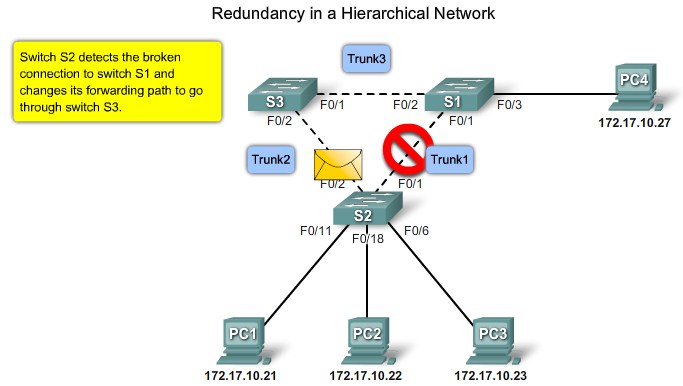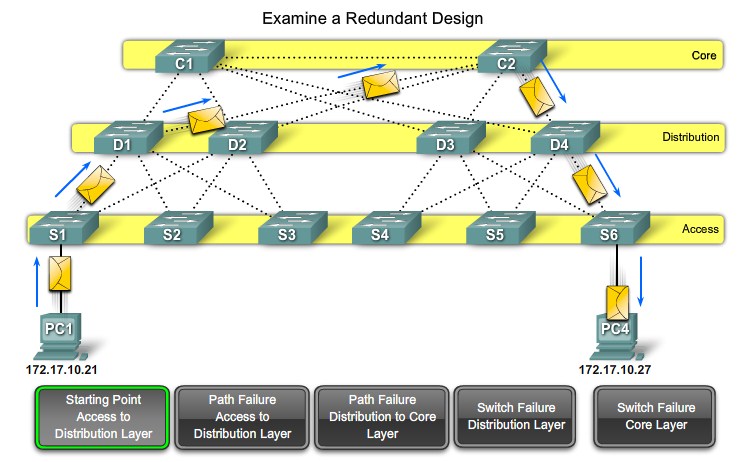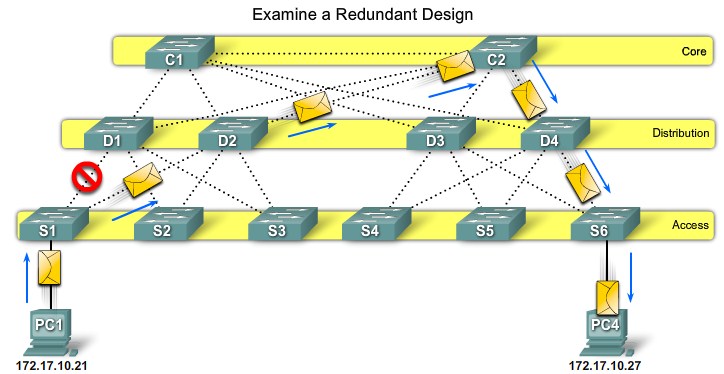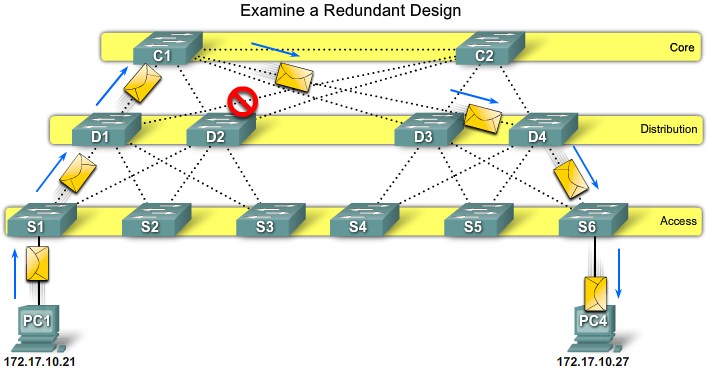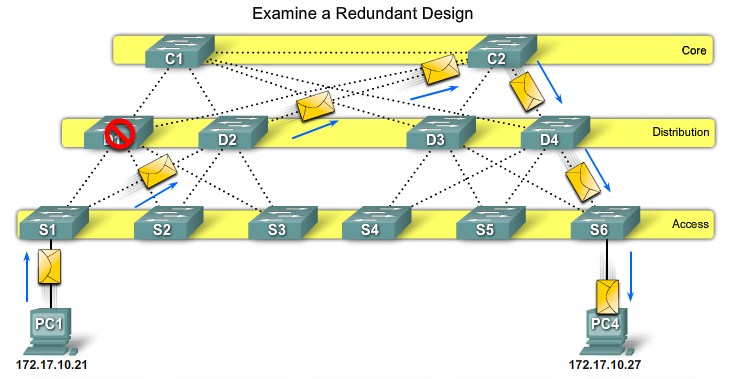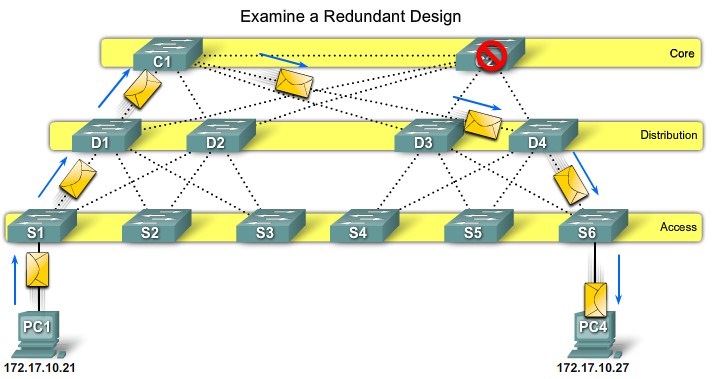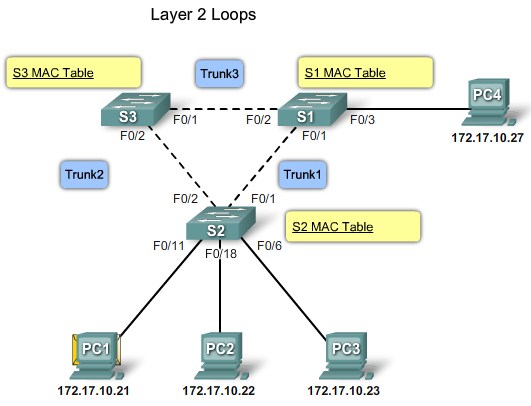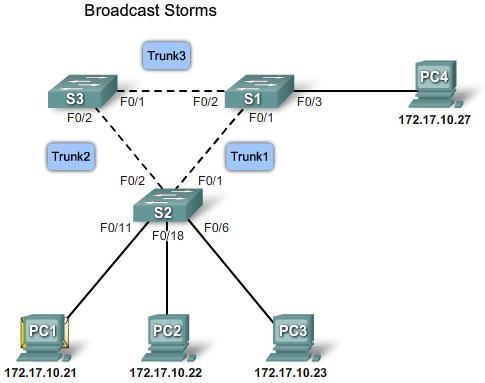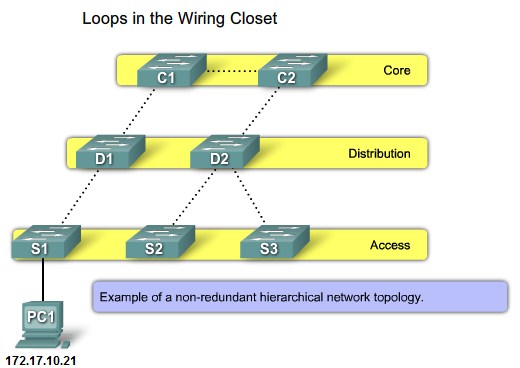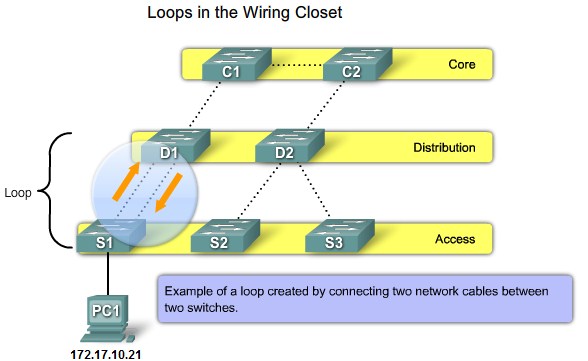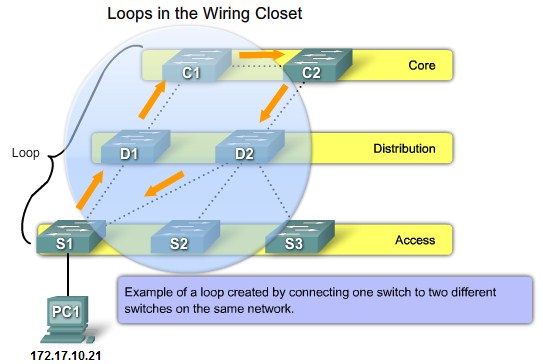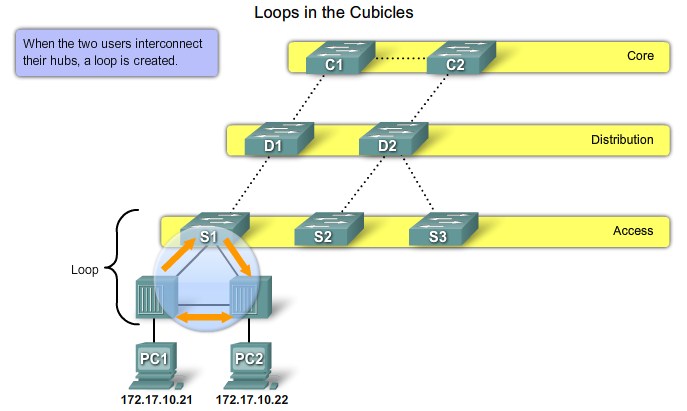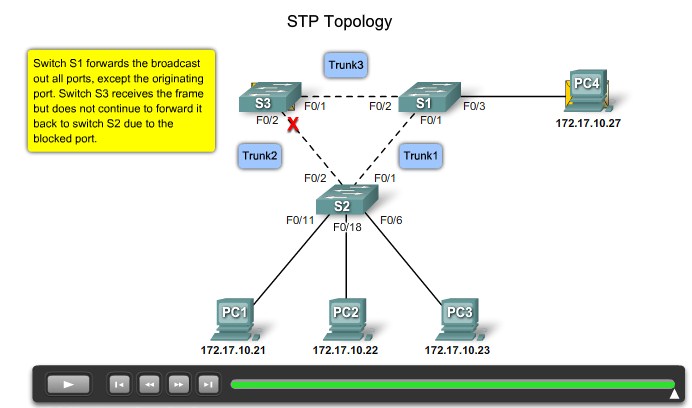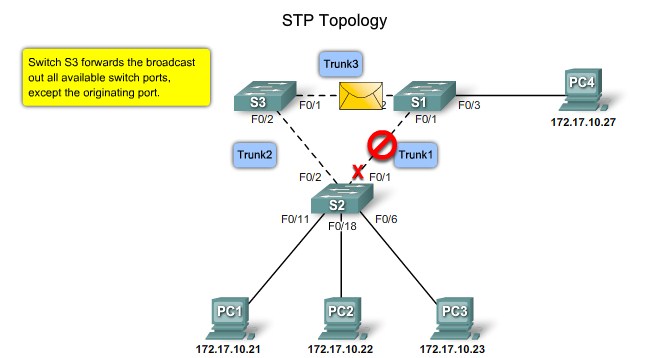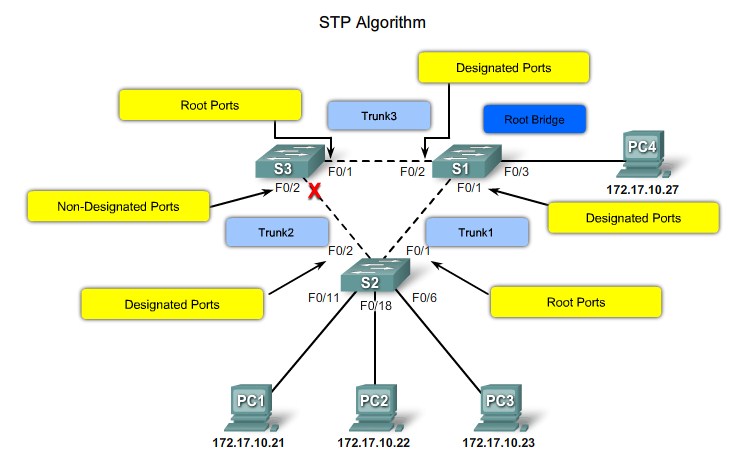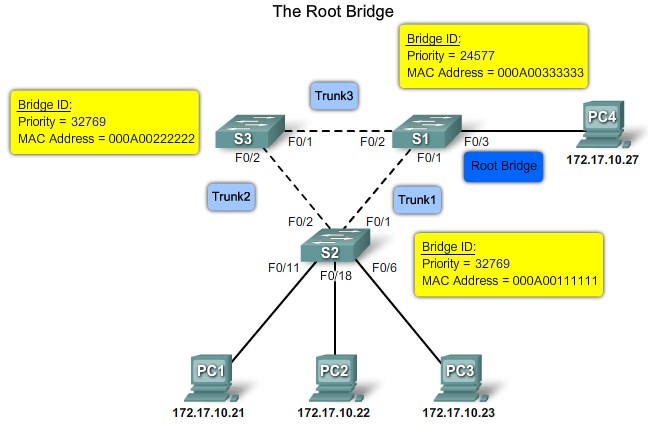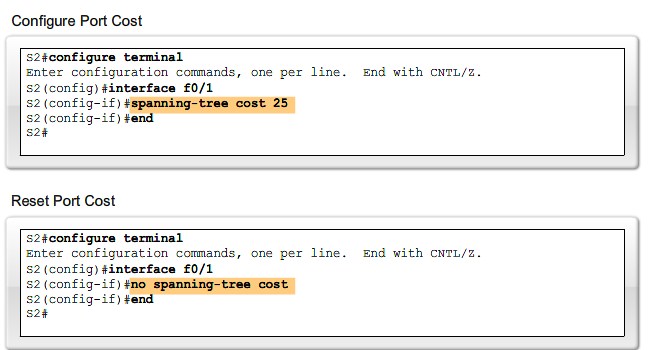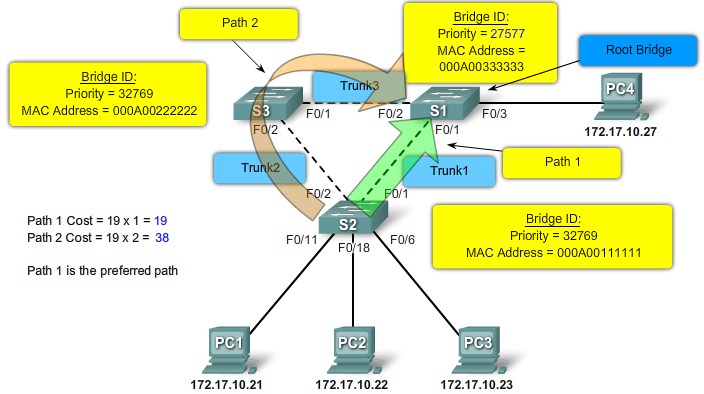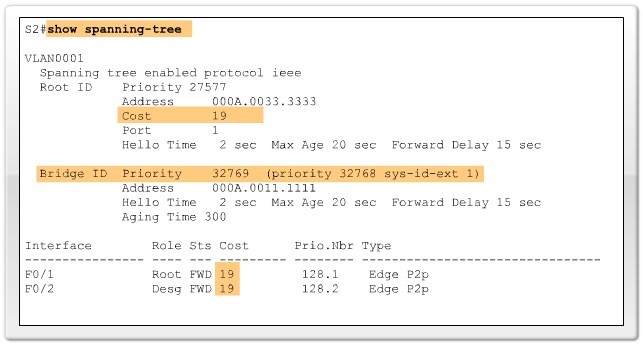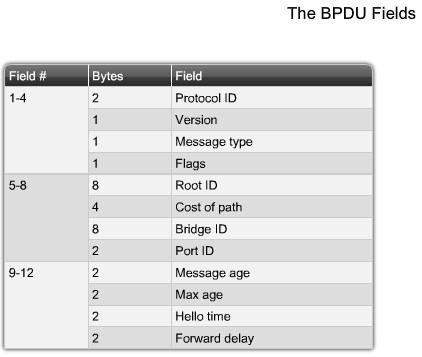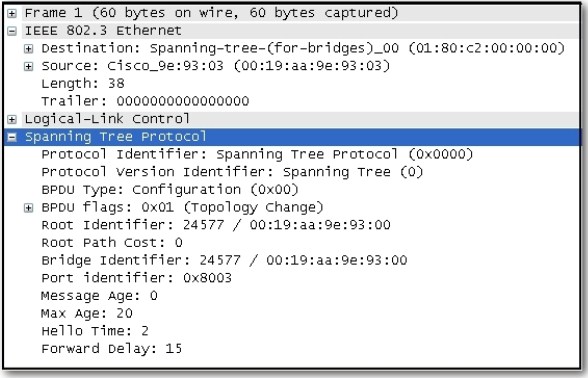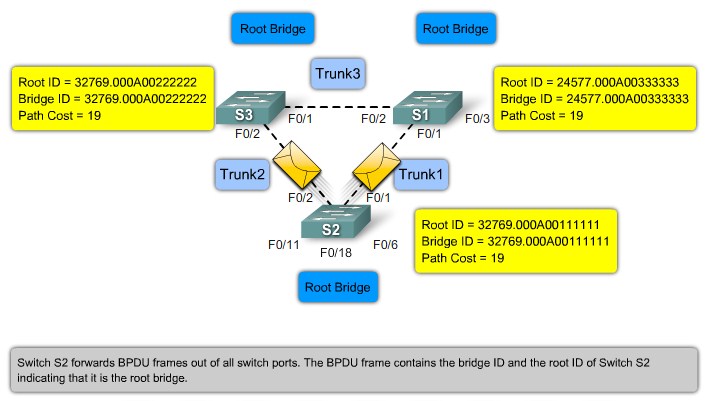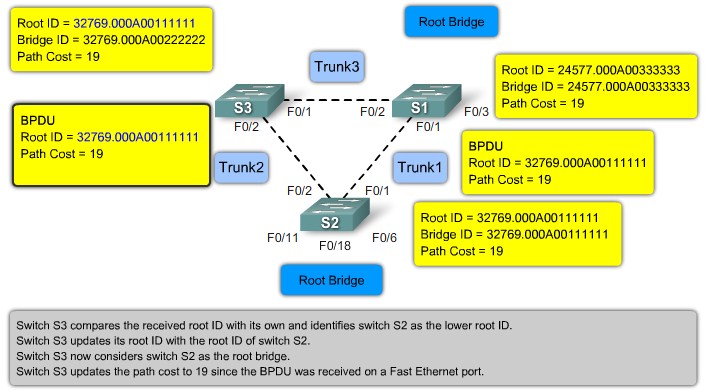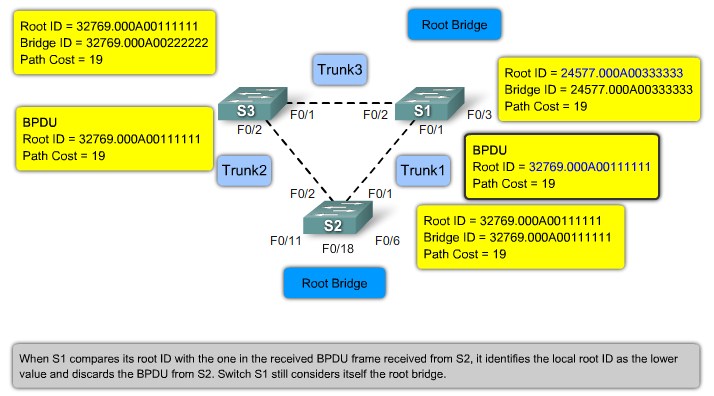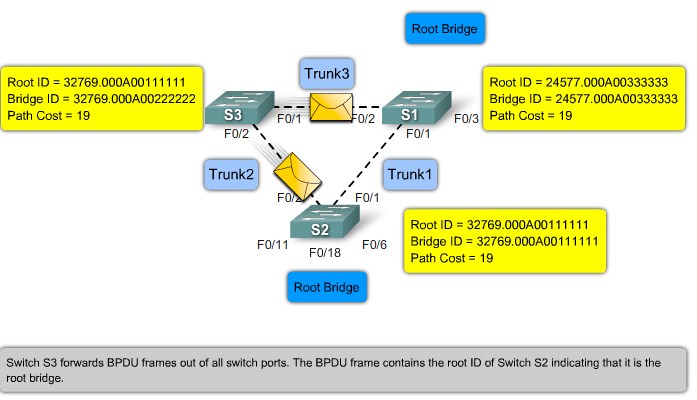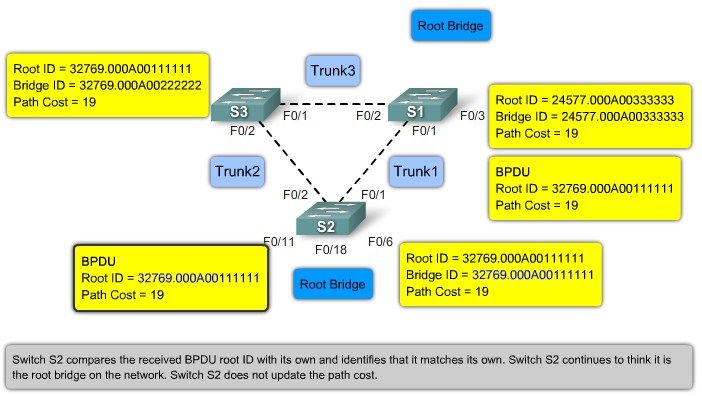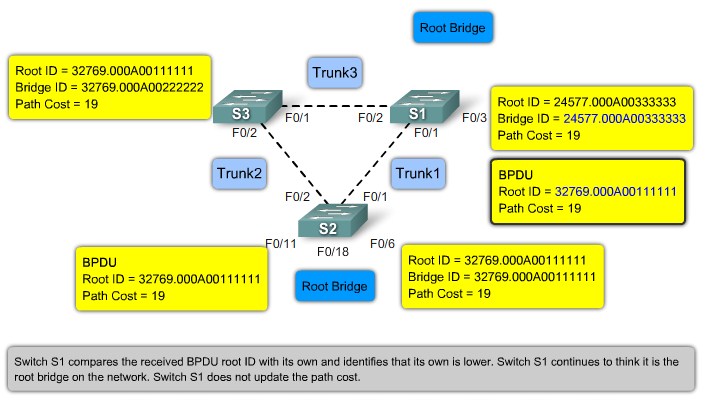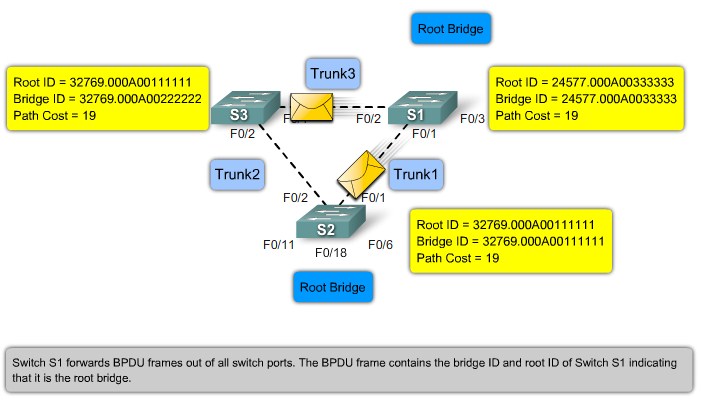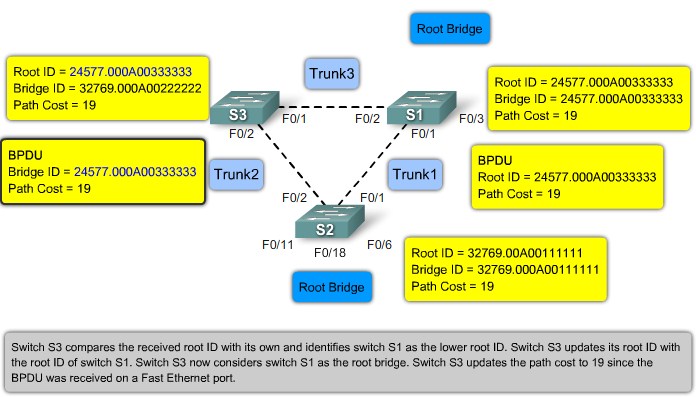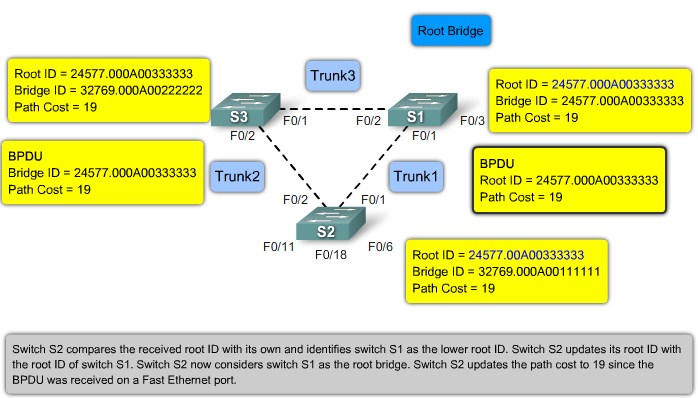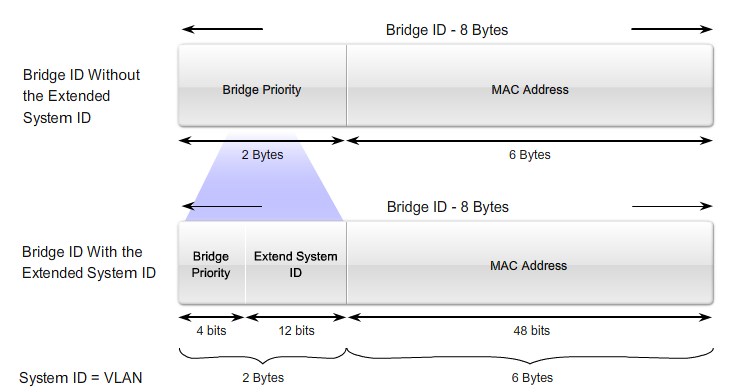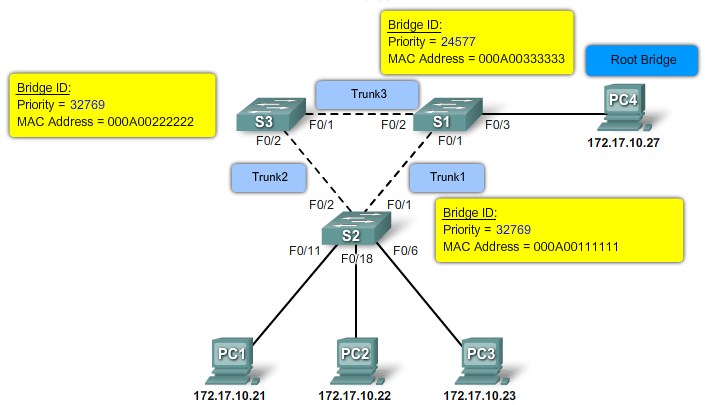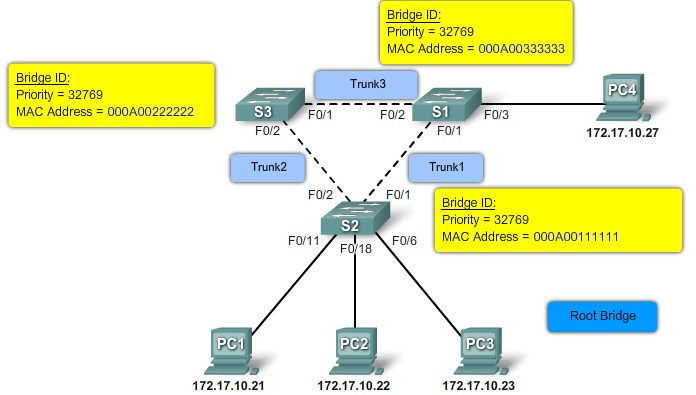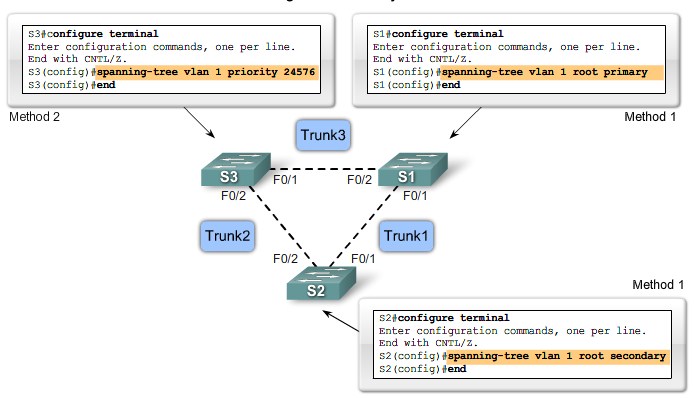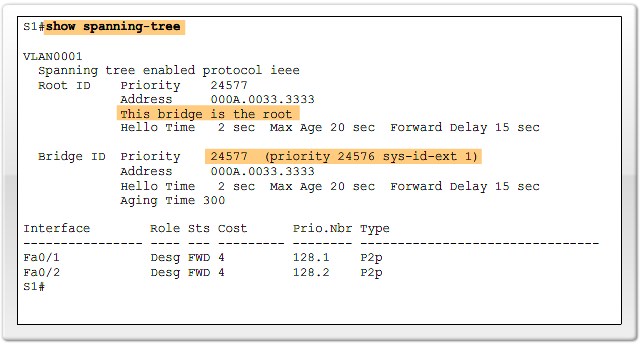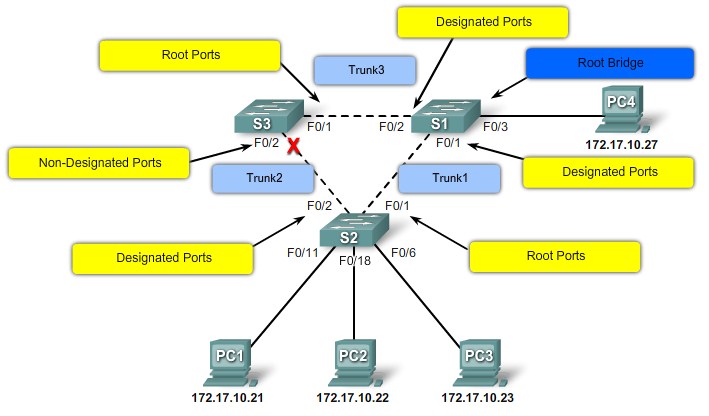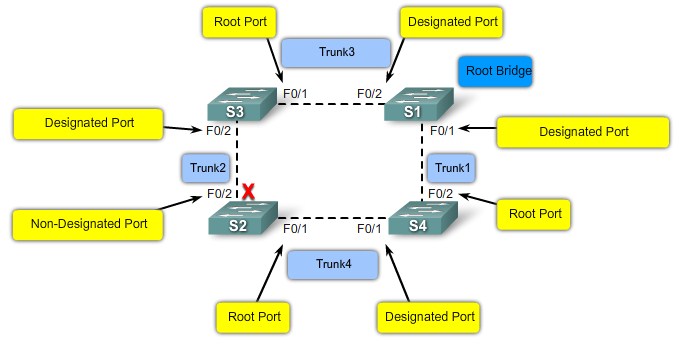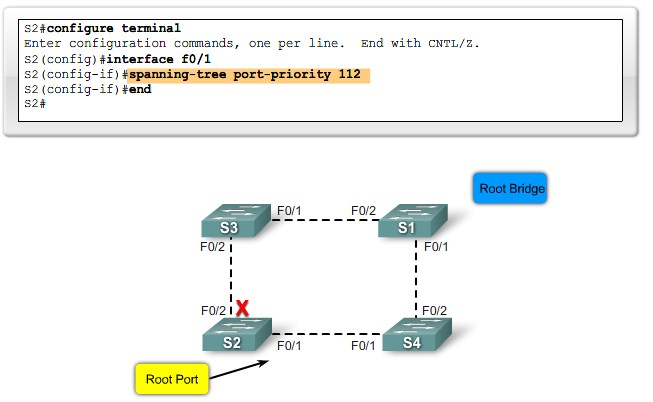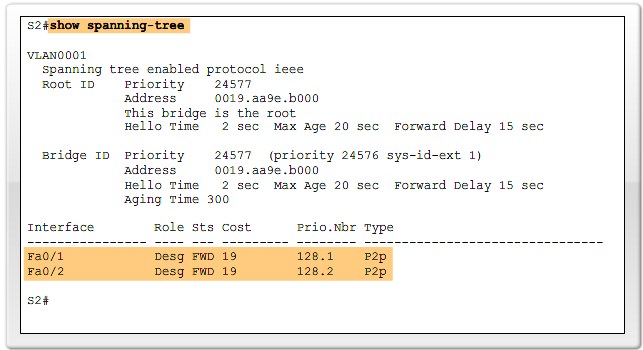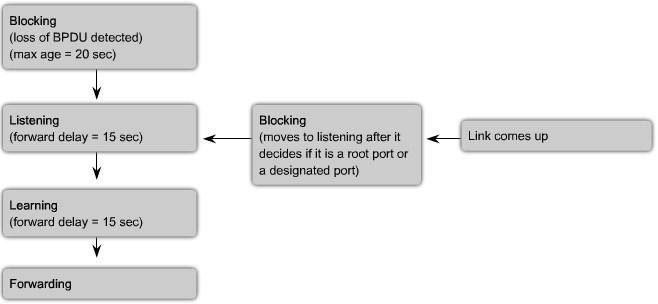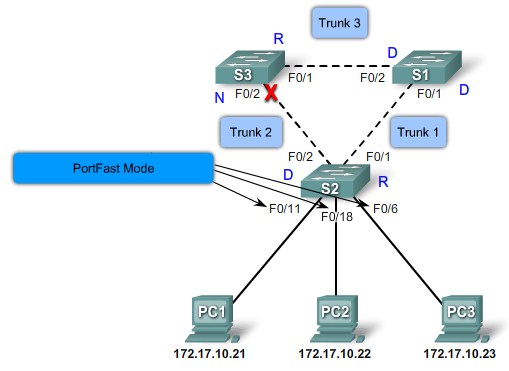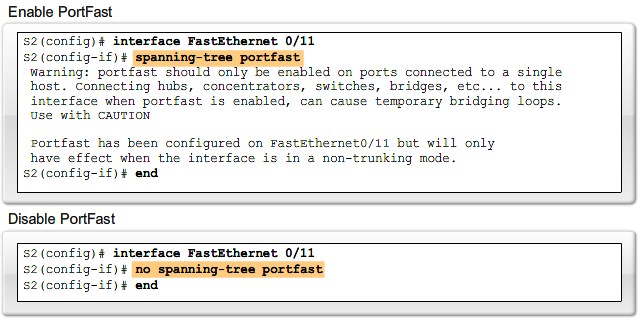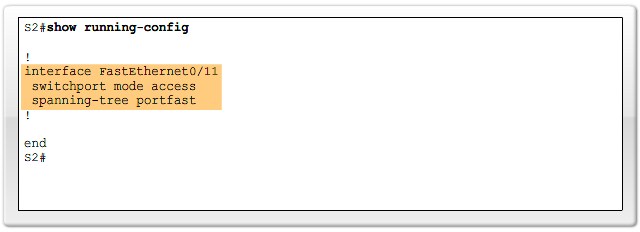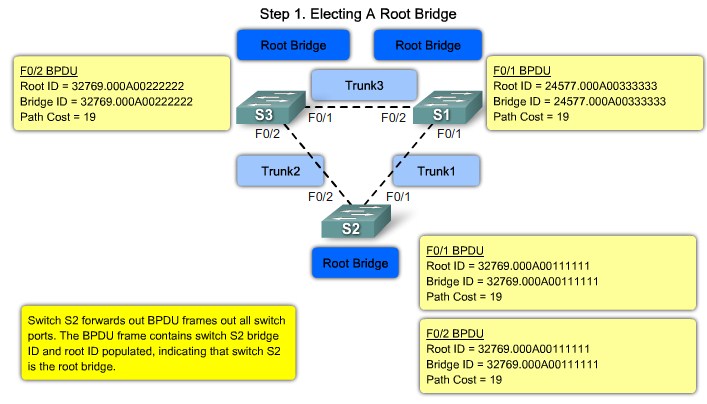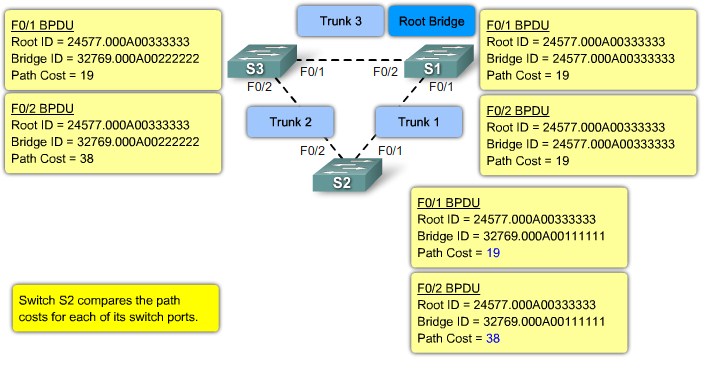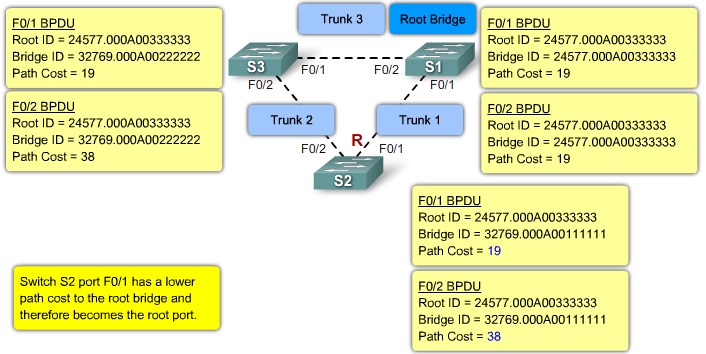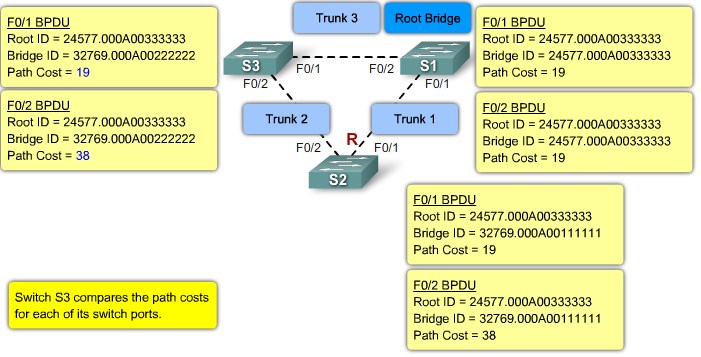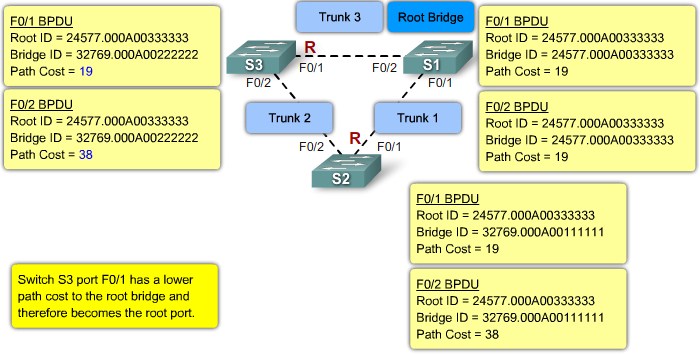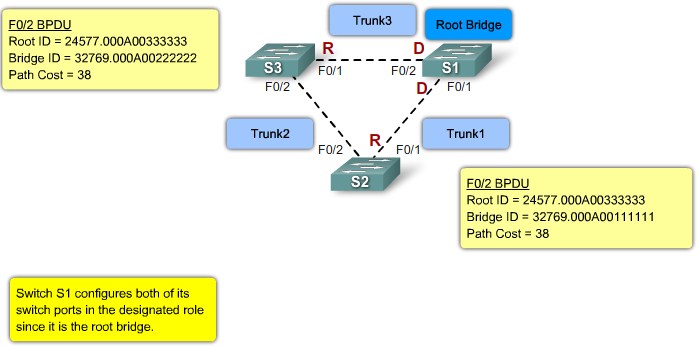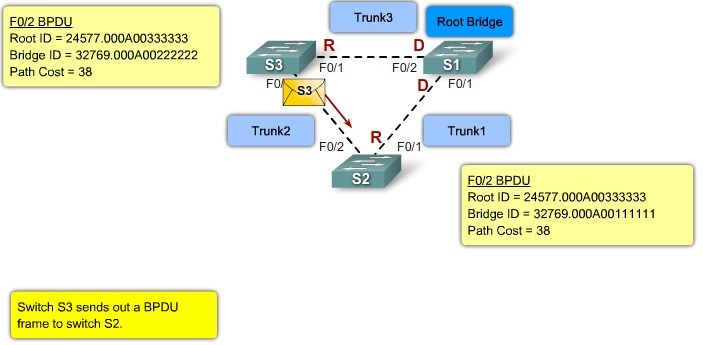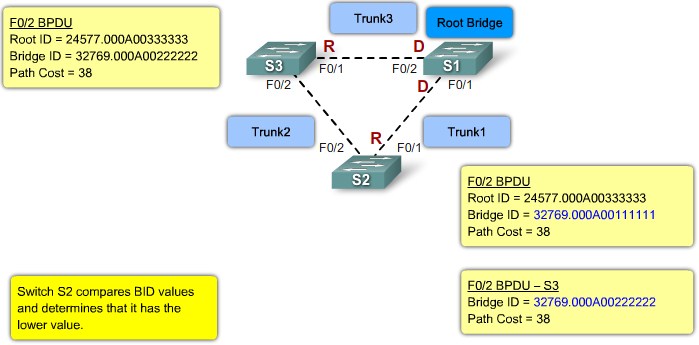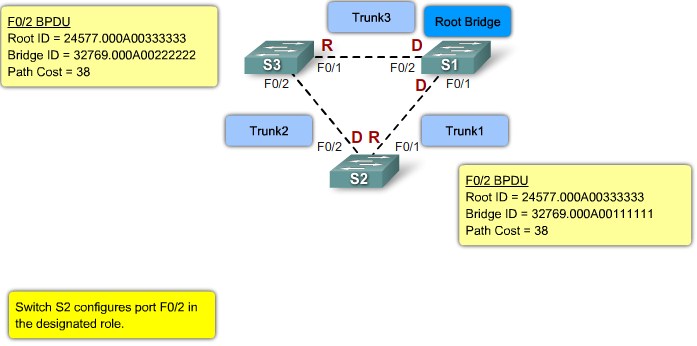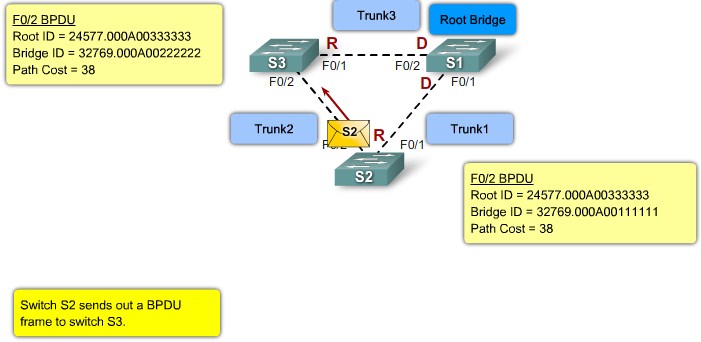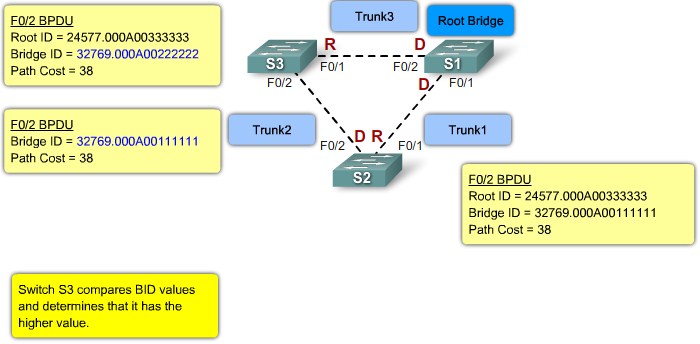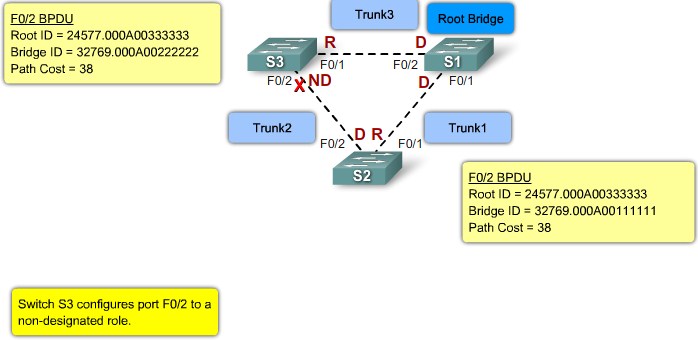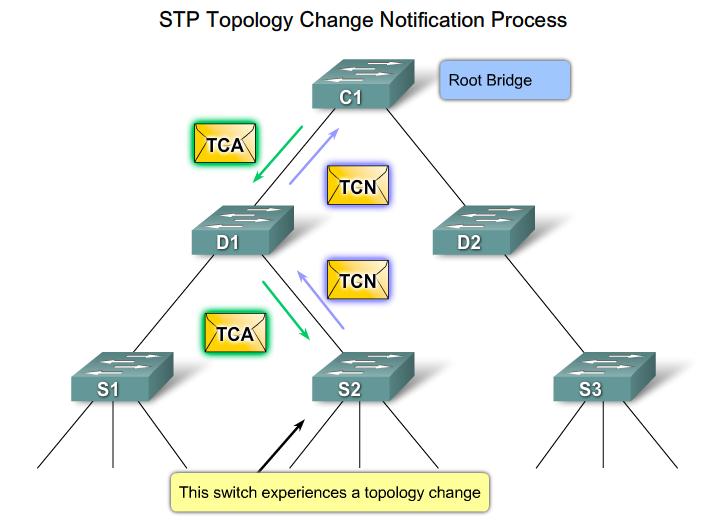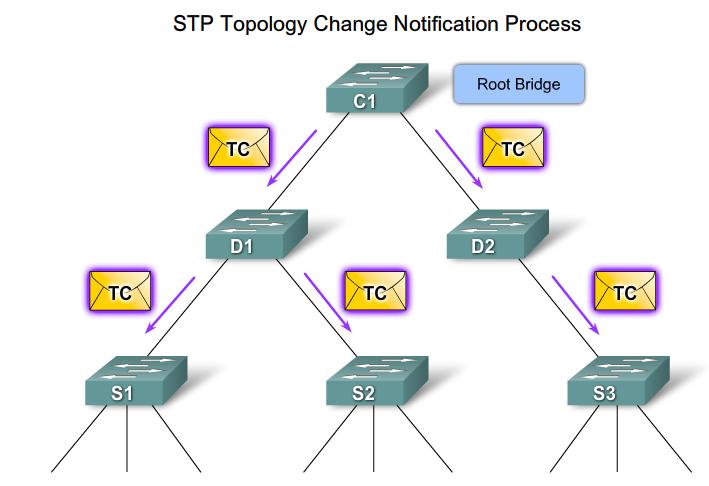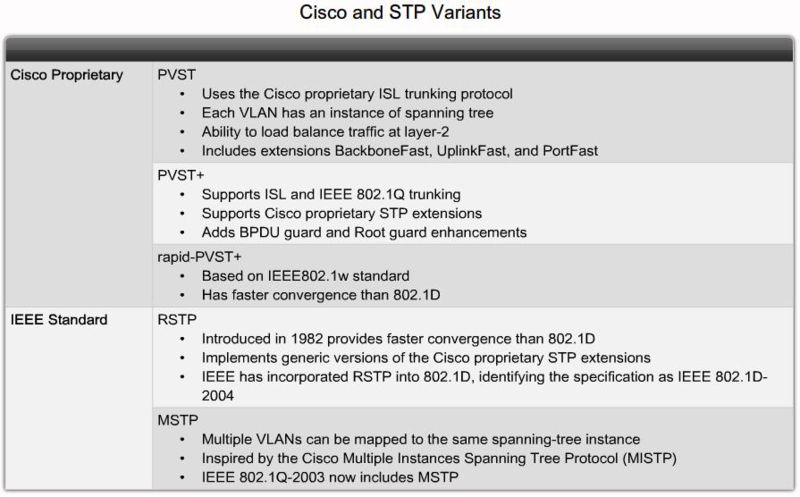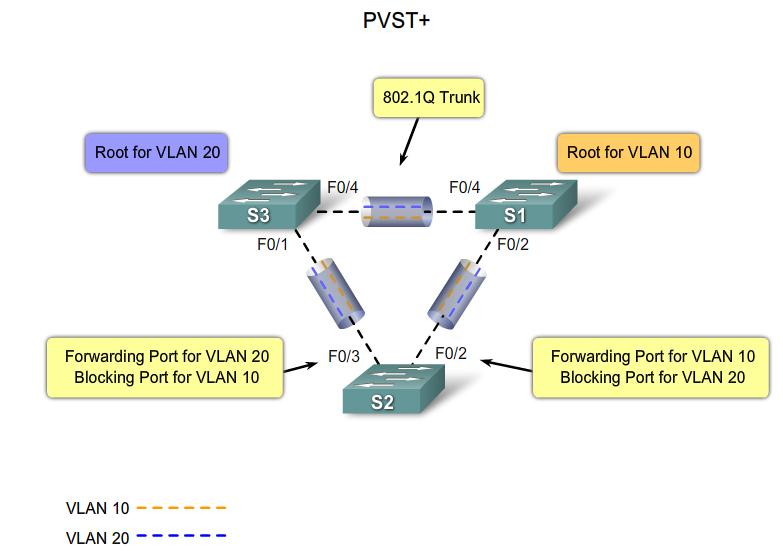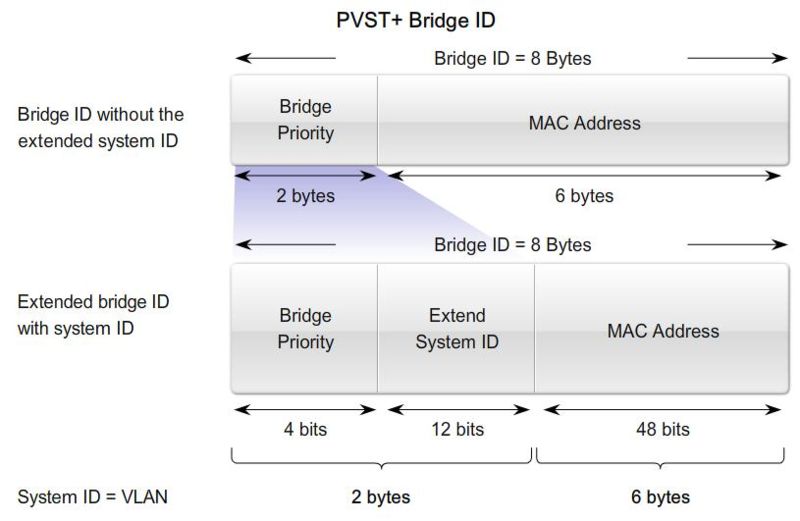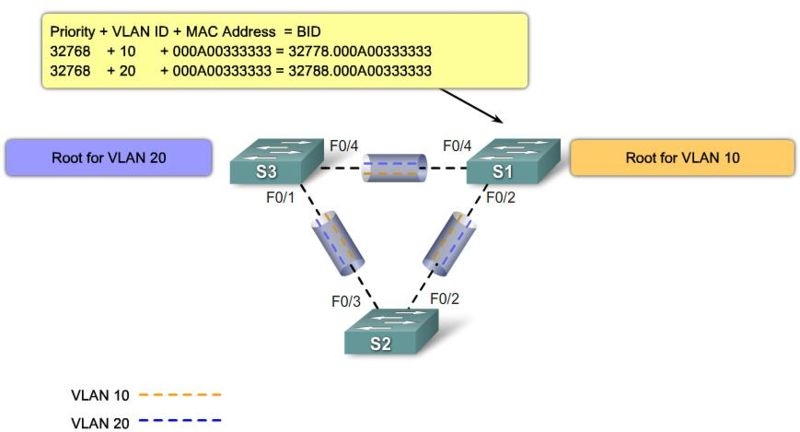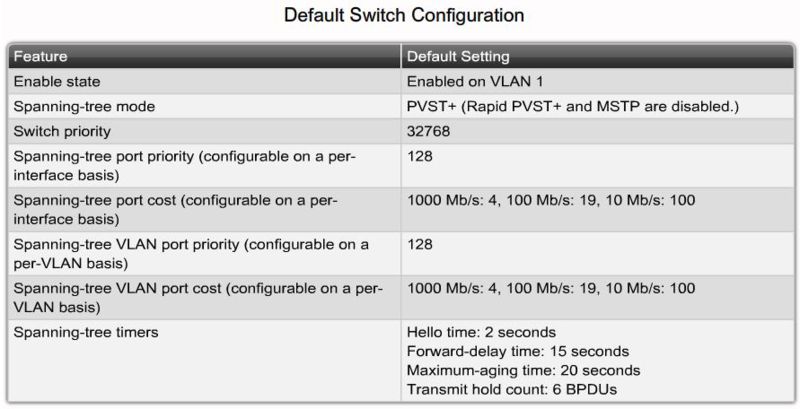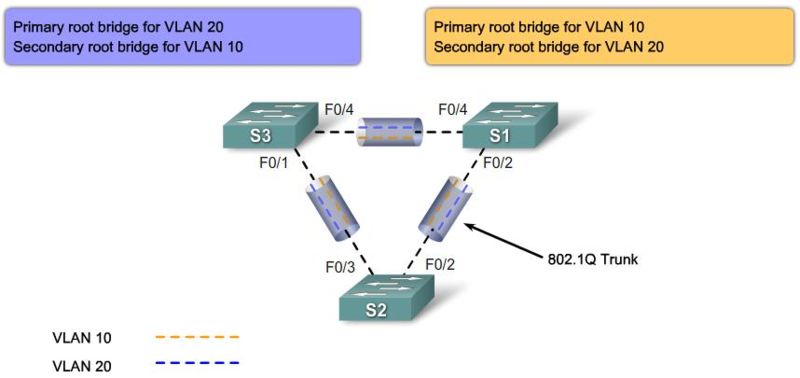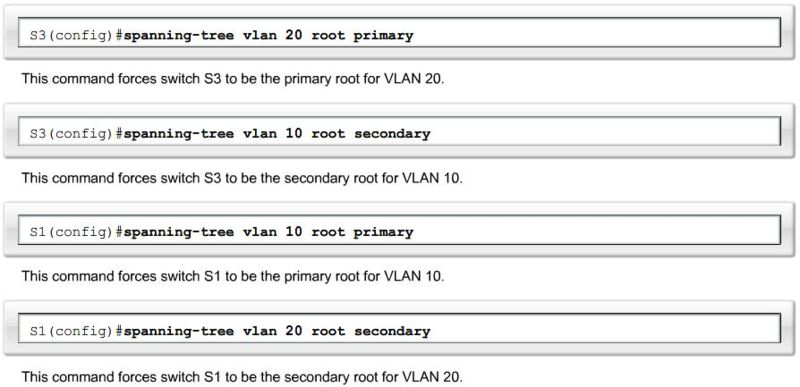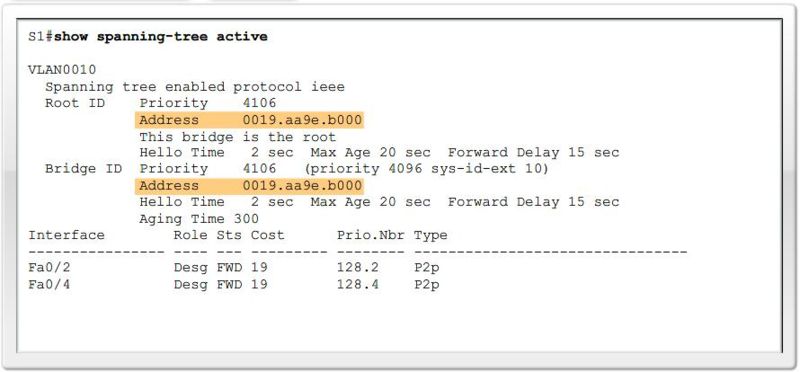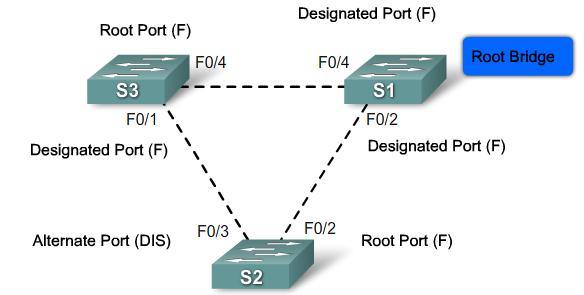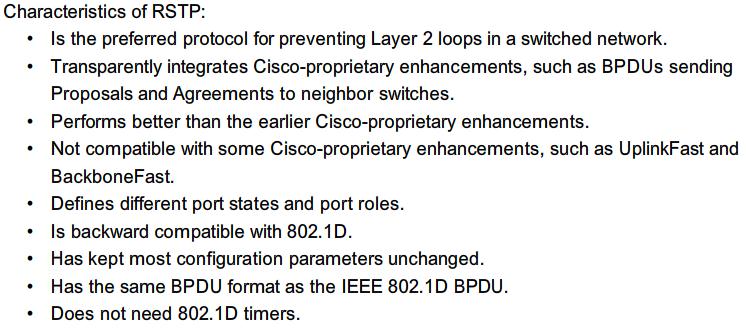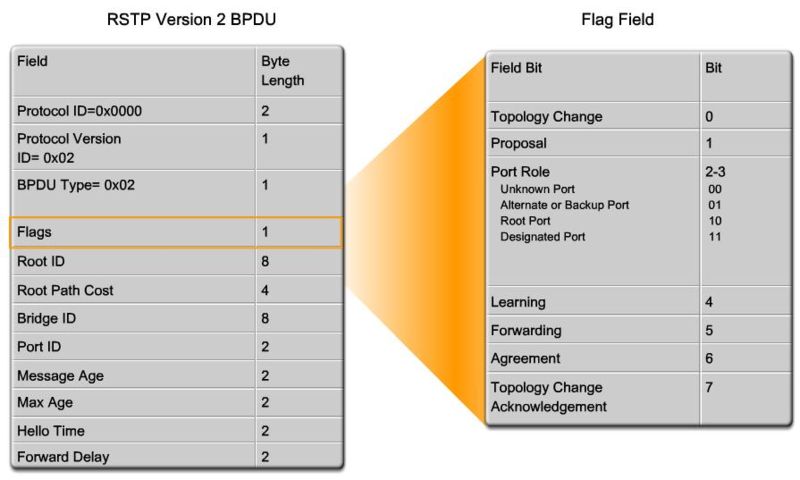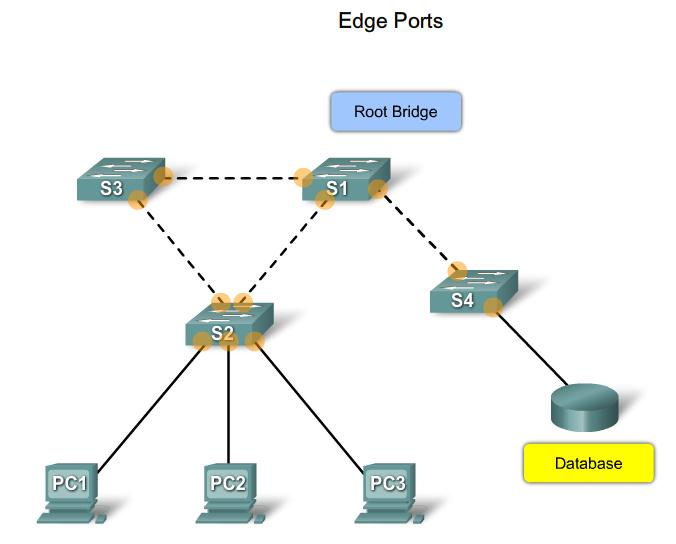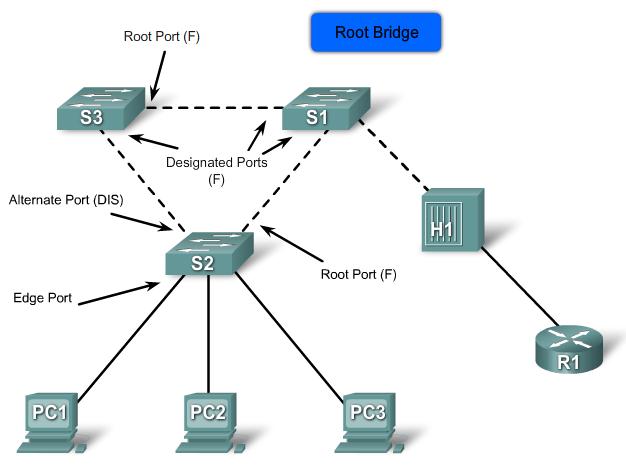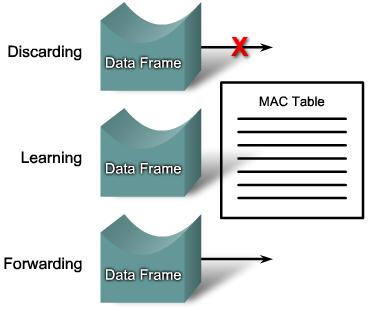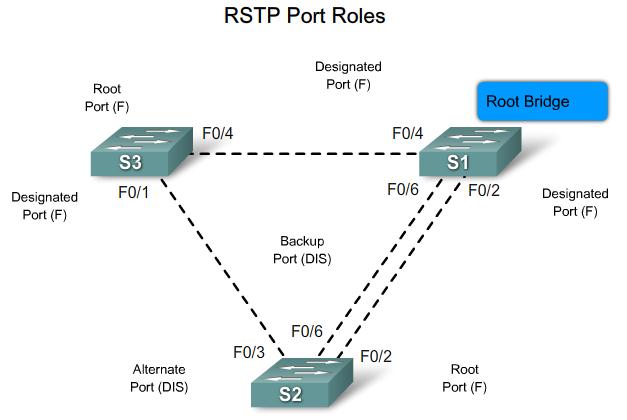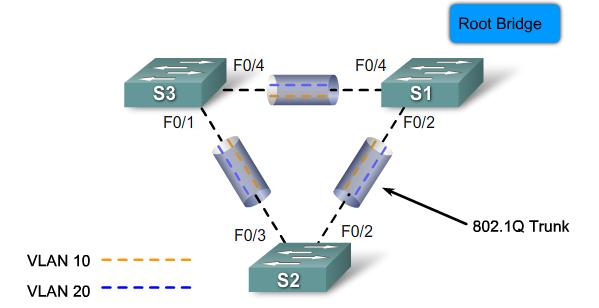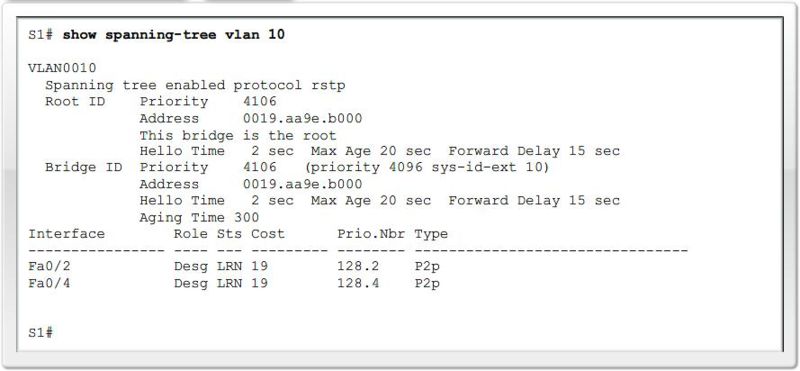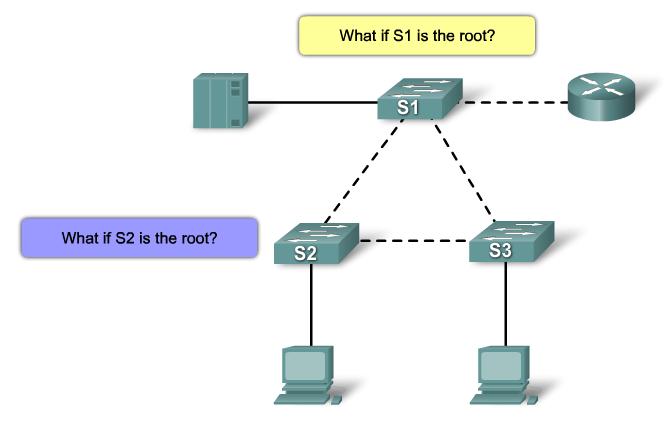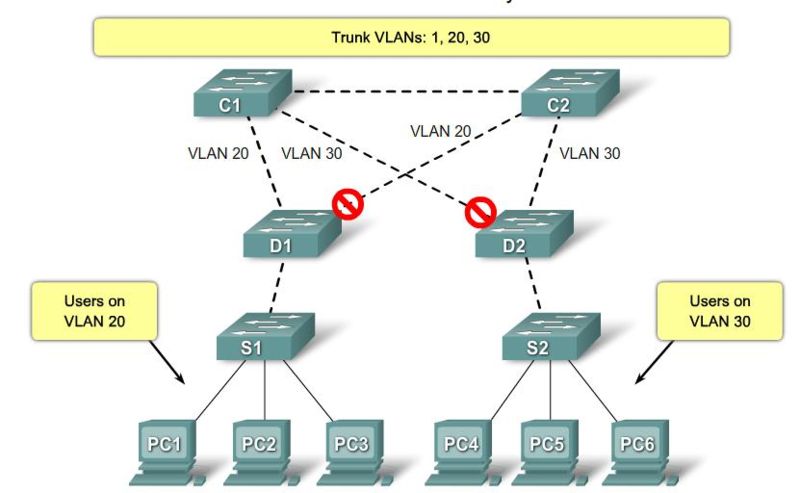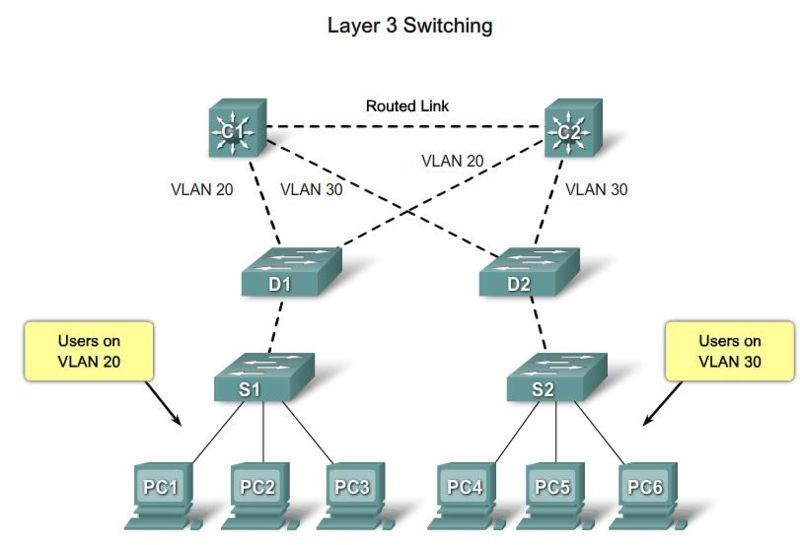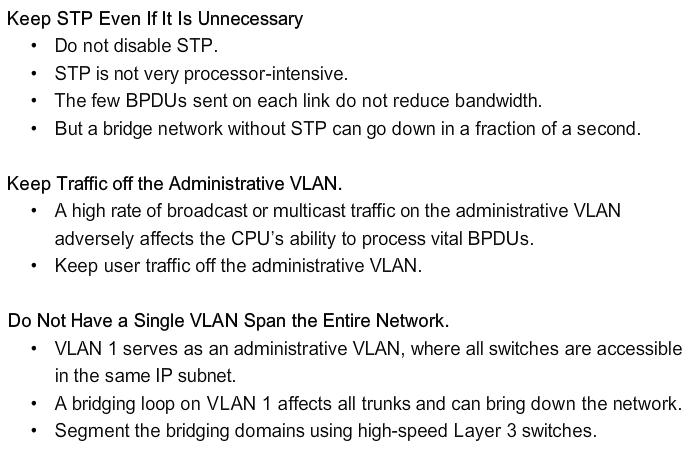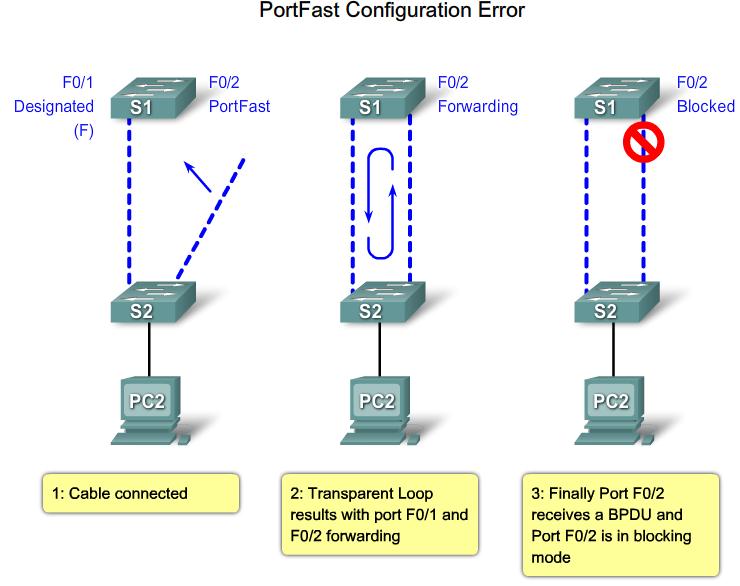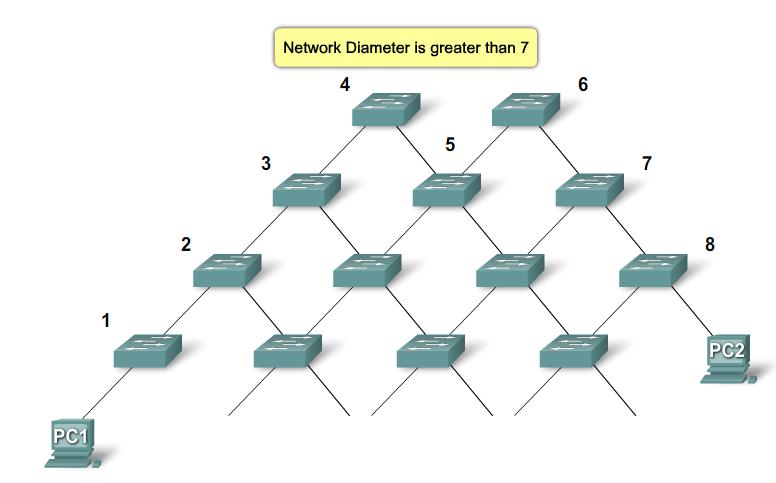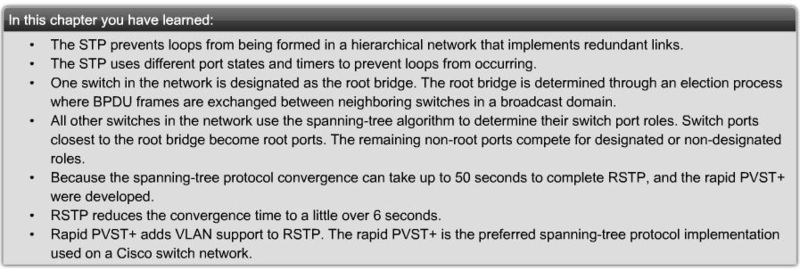Difference between revisions of "CCNA Explorer 3 STP"
m (→5.3.5 STP Topology Change) |
m (added Category:Spanning Tree using HotCat) |
||
| (10 intermediate revisions by 2 users not shown) | |||
| Line 109: | Line 109: | ||
| | | | ||
===Port Roles=== | ===Port Roles=== | ||
| + | ;Root Port: The root port exists on non-root bridges and is the switch port with the best path to the root bridge. | ||
| + | ;Designated Port: The designated port exists on root and non-root bridges. For root bridges, all switch ports are designated ports. Only one designated port is allowed per segment. Designated ports are capable of populating the MAC table. | ||
| + | ;Non-designated Port: The non-designated port is a switch port that is blocked, so it is not forwarding data frames and not populating the MAC address table with source addresses. | ||
| + | ;Disabled Port: The disabled port is a switch port that is administratively shut down. | ||
{| | {| | ||
|[[Image:ScreenShot169.jpg|800px|left|thumb|STP Port Roles]] | |[[Image:ScreenShot169.jpg|800px|left|thumb|STP Port Roles]] | ||
| Line 117: | Line 121: | ||
|- | |- | ||
|[[Image:ScreenShot172.jpg|800px|left|thumb|Verify Port Roles and Priority]] | |[[Image:ScreenShot172.jpg|800px|left|thumb|Verify Port Roles and Priority]] | ||
| − | | | + | |} |
| − | + | ||
===STP Port States and BPDU Timers=== | ===STP Port States and BPDU Timers=== | ||
| + | Port States: | ||
| + | ;Blocking: The port is a non-designated port and does not participate in frame forwarding. The port receives BPDU frames to determine the location and root ID of the root bridge switch and what port roles each switch port should assume in the final active STP topology. | ||
| + | ;Listening: STP has determined that the port can participate in frame forwarding according to the BPDU frames that the switch has received thus far. At this point, the switch port is not only receiving BPDU frames, it is also transmitting its own BPDU frames and informing adjacent switches that the switch port is preparing to participate in the active topology. | ||
| + | ;Learning: The port prepares to participate in frame forwarding and begins to populate the MAC address table. | ||
| + | ;Forwarding: The port is considered part of the active topology and forwards frames and also sends and receives BPDU frames. | ||
| + | ;Disabled: The Layer 2 port does not participate in spanning tree and does not forward frames. The disabled state is set when the switch port is administratively disabled. | ||
{| | {| | ||
|[[Image:ScreenShot173.jpg|800px|left|thumb|STP Port States]] | |[[Image:ScreenShot173.jpg|800px|left|thumb|STP Port States]] | ||
| Line 128: | Line 138: | ||
|- | |- | ||
|[[Image:ScreenShot176.jpg|800px|left|thumb|Configure network diameter]] | |[[Image:ScreenShot176.jpg|800px|left|thumb|Configure network diameter]] | ||
| + | |} | ||
| + | ====PortFast==== | ||
| + | {| | ||
| + | |PortFast is a Cisco technology. When a switch port configured with PortFast is configured as an access port, that port transitions from blocking to forwarding state immediately, bypassing the typical STP listening and learning states. | ||
|- | |- | ||
|[[Image:ScreenShot177.jpg|800px|left|thumb|Cisco Portfast technology]] | |[[Image:ScreenShot177.jpg|800px|left|thumb|Cisco Portfast technology]] | ||
| Line 134: | Line 148: | ||
|- | |- | ||
|[[Image:ScreenShot179.jpg|800px|left|thumb|Verify portfast]] | |[[Image:ScreenShot179.jpg|800px|left|thumb|Verify portfast]] | ||
| − | | | + | |} |
| − | + | ||
==STP Convergence== | ==STP Convergence== | ||
===STP Convergence=== | ===STP Convergence=== | ||
| Line 175: | Line 189: | ||
|- | |- | ||
| | | | ||
| − | === | + | ===STP Topology Change=== |
| + | {| | ||
| + | |[[Image:ScreenShotNew059.jpg|800px|left|thumb|STP Topology Change]] | ||
| + | |- | ||
| + | |Topology change notification(TCN) messages are flooded out the root port, until it reaches the root bridge. | ||
| + | |- | ||
| + | |[[Image:ScreenShotNew060.jpg|800px|left|thumb|STP Broadcast notification]] | ||
| + | |- | ||
| + | |The Root Bridge broadcasts Topology change messages | ||
| + | |- | ||
| + | | | ||
| + | |||
| + | ==PVST+, RSTP and Rapid-PVST+== | ||
| + | ===Cisco and STP Variants=== | ||
| + | {| | ||
| + | |[[Image:ScreenShotNew061.jpg|800px|left|thumb|STP Variants]] | ||
| + | |- | ||
| + | | | ||
| + | ===PVST+=== | ||
| + | {| | ||
| + | |[[Image:ScreenShotNew062.jpg|800px|left|thumb|PVST+]] | ||
| + | |- | ||
| + | |[[Image:ScreenShotNew063.jpg|800px|left|thumb|PVST+ Bridge ID]] | ||
| + | |- | ||
| + | |[[Image:ScreenShotNew064.jpg|800px|left|thumb|PVST+ Bridge ID example]] | ||
| + | |- | ||
| + | |[[Image:ScreenShotNew065.jpg|800px|left|thumb|Default PVST+ configuration]] | ||
| + | |- | ||
| + | |[[Image:ScreenShotNew066.jpg|800px|left|thumb|Configure PVST+]] | ||
| + | |- | ||
| + | |[[Image:ScreenShotNew067.jpg|800px|left|thumb|Configure PVST+]] | ||
| + | |- | ||
| + | |[[Image:ScreenShotNew068.jpg|800px|left|thumb|Configure PVST+ Priority]] | ||
| + | |- | ||
| + | |[[Image:ScreenShotNew069.jpg|800px|left|thumb|Verify PVST+]] | ||
| + | |- | ||
| + | | | ||
| + | ===RSTP=== | ||
| + | {| | ||
| + | |[[Image:ScreenShotNew070.jpg|800px|left|thumb|RSTP]] | ||
| + | |- | ||
| + | |[[Image:ScreenShotNew071.jpg|800px|left|thumb|Characteristics of RSTP]] | ||
| + | |- | ||
| + | |[[Image:ScreenShotNew072.jpg|800px|left|thumb|RSTP BPDU]] | ||
| + | |- | ||
| + | | | ||
| + | ===Edge Ports=== | ||
| + | {| | ||
| + | |[[Image:ScreenShotNew073.jpg|800px|left|thumb|Edge Ports]] | ||
| + | |- | ||
| + | | | ||
| + | ===Link Types=== | ||
{| | {| | ||
| + | |[[Image:ScreenShotNew074.jpg|800px|left|thumb|Link Types]] | ||
| + | |- | ||
| + | | | ||
| + | '''Point-to-point Link Type''' - Links attaches to switch ports that are operating in full-duplex mode<br/> | ||
| + | '''Shared Link Type''' - This link is attached to a port that is operating in half-duplex mode<br/> | ||
| + | |- | ||
| | | | ||
| + | ===RSTP Port States and Port Roles=== | ||
| + | {| | ||
| + | |[[Image:ScreenShotNew075.jpg|800px|left|thumb|RSTP Port States]] | ||
| + | |- | ||
| + | |[[Image:ScreenShotNew076.jpg|800px|left|thumb|RSTP Port States]] | ||
| + | |- | ||
| + | |[[Image:ScreenShotNew077.jpg|800px|left|thumb|RSTP Port States]] | ||
| + | |- | ||
| + | |[[Image:ScreenShotNew078.jpg|800px|left|thumb|RSTP Port Roles]] | ||
| + | |- | ||
| + | | | ||
| + | ===Configure Rapid-PVST+=== | ||
| + | {| | ||
| + | |[[Image:ScreenShotNew079.jpg|800px|left|thumb|Rapid-PVST+ Topology]] | ||
| + | |- | ||
| + | |[[Image:ScreenShotNew080.jpg|800px|left|thumb|Rapid-PVST+ Example configuration]] | ||
| + | |- | ||
| + | |[[Image:ScreenShotNew081.jpg|800px|left|thumb|Rapid-PVST+ verification]] | ||
| + | |- | ||
| + | | | ||
| + | ===Design STP for Trouble Avoidance=== | ||
| + | {| | ||
| + | |[[Image:ScreenShotNew082.jpg|800px|left|thumb|Know where the root is]] | ||
| + | |- | ||
| + | |[[Image:ScreenShotNew083.jpg|800px|left|thumb|Manual Pruning]] | ||
| + | |- | ||
| + | |[[Image:ScreenShotNew084.jpg|800px|left|thumb|Layer 3 Switching]] | ||
| + | |- | ||
| + | |[[Image:ScreenShotNew085.jpg|800px|left|thumb|Layer 3 Switching]] | ||
| + | |- | ||
| + | | | ||
| + | ===Troubleshoot STP Operation=== | ||
| + | {| | ||
| + | |[[Image:ScreenShotNew086.jpg|800px|left|thumb|Troubleshoot a failure]] | ||
| + | |- | ||
| + | |[[Image:ScreenShotNew087.jpg|800px|left|thumb|PortFast configuration error]] | ||
| + | |- | ||
| + | |[[Image:ScreenShotNew088.jpg|800px|left|thumb|Network diameter issues]] | ||
| + | |- | ||
| + | | | ||
| + | ==Chapter Summary== | ||
| + | {| | ||
| + | |[[Image:ScreenShotNew089.jpg|800px|left|thumb|Chapter summary]] | ||
|- | |- | ||
| | | | ||
| + | |||
| + | [[Category:Spanning Tree]] | ||
Latest revision as of 08:33, 13 August 2013
Contents
STP
Redundant Layer 2 Topologies
Redundancy
Issues with Redundancy
|
